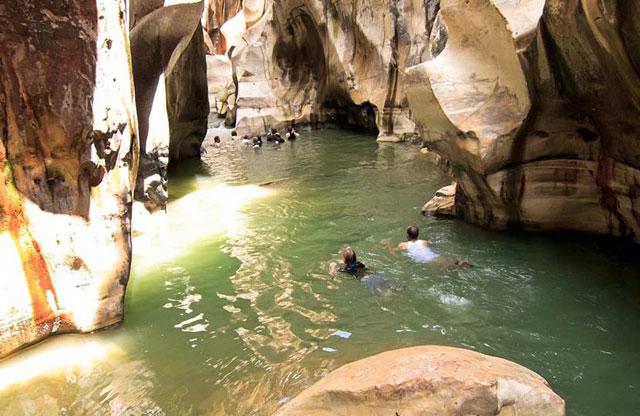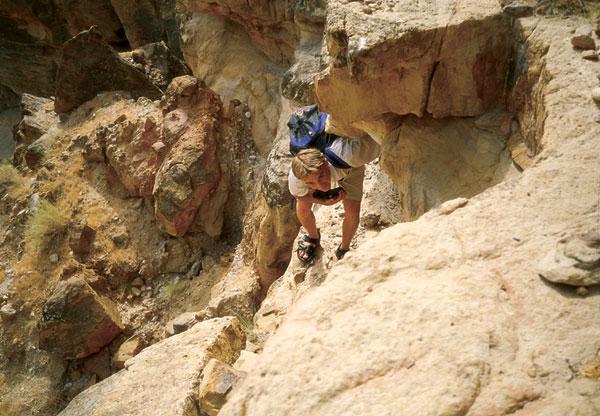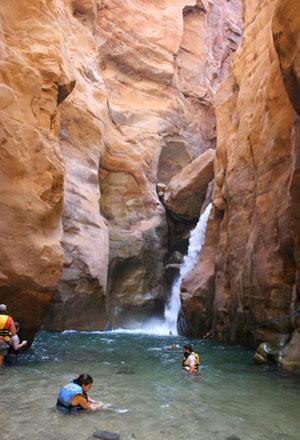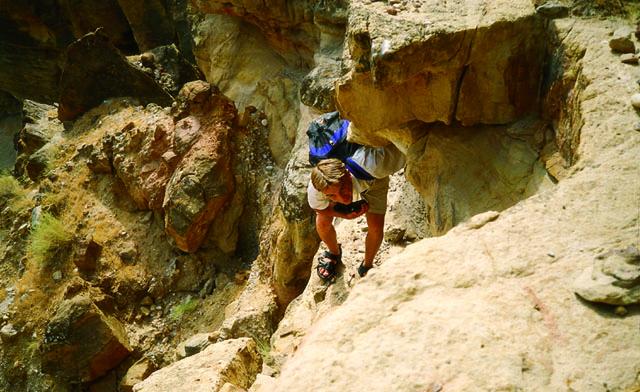You are here
Mujib reserve reopens with stricter safety measures in wake of last year’s Dead Sea floods
By Hana Namrouqa - May 12,2019 - Last updated at May 12,2019

The Mujib Biosphere Reserve says on Sunday that it will open for a new adventure season with stricter safety measures to minimise risks and protect adventure seekers from dangers (Photo courtesy of Wild Jordan)
AMMAN — The Mujib Biosphere Reserve will open for a new adventure season with stricter safety measures to minimise risks and protect adventure seekers from dangers, according to the reserve manager, Hisham Dheisat.
The new measures were introduced at the ecotourism destination following the Dead Sea tragedy on October 25 last year, which claimed the lives of 21 people, most of whom were students on a school hiking trip to a water valley that overlooks the Dead Sea.
Dheisat underlined that the reserve, operated and managed by the Royal Society for the Conservation of Nature (RSCN), closes every winter due to flashfloods and rising water levels in its valleys and trails and reopens in spring only after the many ponds and water trails are inspected for safety by a specialised team of experts.
Reevaluating the level of difficulty of every trail, carrying out maintenance and adding new safety regulations and tools are standard procedures before reopening the reserve every year, Dheisat said.
“However, due to the unfortunate incident and the strong flashfloods that the area witnessed this past winter, we have introduced more and new safety measures,” Dheisat told The Jordan Times.
More ropes and warning signs were installed across the trails to assist hikers, while visitors below the age of 18 are barred from entering the hiking trails, according to the RSCN official, who noted that the reserve used to allow visitors of 16 years of age and older into the trails, provided that they are accompanied by their caregivers.
In addition, the self-guided water trail that starts from the reserve’s visitor’s centre and ends by the waterfall now has at least three positioned guides at all times during opening hours, according to Dheisat.
The reserve manager highlighted that no serious accidents took place at the reserve, at least not in the past decade.
In 2018, “the reserve received 20,000 visitors, most of whom were Jordanians. This year, we expect the number to increase”, Dheisat said.
He also indicated that October’s Dead Sea tragedy had very little impact, if any, on hiking activities in the reserve’s water trails.
A destination for hiking and camping, the Mujib reserve is home to high-altitude summits and waterfalls over an area of 220sq.km.
The Mujib Biosphere Reserve is home to seasonal and permanent rivers that flow through several valleys, as well as ponds and waterfalls.
Three large catchments, Wadi Mujib, Wadi Hidan and Wadi Zarqa, characterise the area’s complex drainage system with its permanent water flow throughout the year.
The richest vegetation is found in the valley beds, including oleander, palm, wild fig and tamarix trees, as well as reed beds along riverbanks, according to the RSCN.
Surveys indicate that Mujib, the lowest-altitude nature reserve in the world, is home to over 300 species of plants, 10 species of carnivores and numerous species of resident and migratory birds.
Bordered by the Rift Valley, the world’s second-most used flyway, which hosts more than 1.5 million migratory birds during the spring and autumn, the reserve is strategically important for bird migration.
Related Articles
AMMAN — The Mujib Biosphere Reserve has reopened for another adventure season, offering this year two new activities to thrill seekers, the
The Mujib Biosphere Reserve has reopened for another adventure season with additional safety measures in place to protect its visitors, according to its director, Hisham Dheisat.
Heavy rain during the winter created two new ponds in the Siq Trail at the Mujib Biosphere Reserve, which has reopened for another adventure season, reserve director, Hisham Dheisat, said on Wednesday.


















